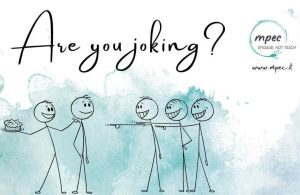Laughter, they say, is the universal language, but have you ever wondered how cultural nuances shape our sense of humour? Join us on an exciting linguistic journey as we delve into the subjectivity of humour in American, Irish, and British English, uncovering the delightful world of comedy and its regional flavours.
Written with love by: Suzanne Pilch, ICF Certified Coach & MPEC Partner
Humour is a unique and intricate facet of human expression, reflecting diverse cultural backgrounds and societal contexts. In this article, we will examine how linguistic variations across American, Irish, and British English influence comedic styles and audience responses. By shining a spotlight on famous comedians and their work, we aim to dissect the nuances, punchlines, and clever wordplay that tickle the funny bones of each audience.
It can be an amazing intellectual adventure to navigate the intricacies of linguistic humour. Especially if you are learning English, we invite you to explore the most iconic examples from renowned English comedians to dissect their techniques and understand how cultural idiosyncrasies make them uniquely hilarious.
From the sharp-witted sarcasm of American comedians to the whimsical wordplay of British humorists, and the Irish charm that weaves tales of absurdity, this exploration will help you gain so much fascinating vocabulary, cultural knowledge and will – overall – enhance your fluency in English.
But it’s not just about the laughs and language
Understanding the subjectivity of humour enables us to appreciate diverse perspectives, fostering cross-cultural understanding and creating bridges across linguistic boundaries. As professionals working in a globalised world, this insight can enhance our communication skills, build stronger connections, and foster a more inclusive and harmonious work environment. It’s a fascinating journey to explore the comedic nuances found in American, Irish, and British English. Let’s take a hilarious ride through these variations and dive into specific examples from famous comedians.
So, let the laughter commence! 😄🌍✨
American comedy often leans towards directness, sarcasm, and a punchy delivery. One iconic comedian who embodies this style is Jerry Seinfeld.
In his observational humour, he dissects everyday situations with wit and sharpness. For example:
“Why do they call it rush hour when nothing moves?” (pronounced “ru-ow-sh hour”)
Notice the play on words in the pronunciation of “rush hour.” By emphasising the misalignment between the term and the actual situation, Seinfeld creates a humorous twist on the common frustration of traffic congestion.
British Comedy:
Ah, the British are renowned for their dry wit, irony, and masterful use of understatement. A prime example of British comedy can be found in Ricky Gervais’ work. Here is his 2020 Golden Globes monologue:
Gervais often tackles taboo subjects with a fearless and sarcastic style. Take this example from his stand-up:
“Why did the scarecrow win an award? Because he was outstanding in his field… And he was stuffed.”
Gervais employs a classic pun here, relying on the double meaning of “outstanding” to create a humorous twist. The deadpan delivery adds to the comedic effect, showcasing the British talent for subtle irony.
The English often tease the Americans, saying that their humor is too simple, direct, and lacks depth – as you can hear in the video below:
Irish comedy often shines through its storytelling, wordplay, and the delightful charm of the performers. A prominent Irish comedian known for his wit and storytelling ability is Dylan Moran. He weaves humorous tales with a touch of self-deprecation. Here’s a classic example:
“They say ‘don’t try this at home,’ so I’m coming to your house to try it.”
In this case, Moran uses a simple twist on the well-known phrase “don’t try this at home.” By flipping it around, he creates a comical contradiction that tickles the audience’s funny bone.
We hope that with this article and the videos we have chosen, we have shown you how humor is truly subjective, and what may make one person laugh might not elicit the same reaction in another.
It is fascinating to observe how cultural origins and linguistic influences shape comedic tastes and styles, and spending time trying to understand the complex art of making people laugh can be a great way to grow both linguistically and culturally.
#HumorInEnglish #LearningEnglishWithHumor #EnglishLanguageHumor #LaughAndLearnEnglish #HumorousLanguageLearning #FunnyEnglishLessons #ComedyInLanguageLearning #LanguageLearningThroughHumor #WordplayAndEnglishLearning #FunnyLanguageExpressions #LaughYourWayToEnglish #HumorBoostsEnglishSkills #EngagingEnglishThroughHumor #HumorouslyLearningEnglish #JokesAndEnglishLearning #FunnyLanguageTips #EntertainingEnglishEducation #LinguisticLaughter #ComedicApproachToEnglishLearning #LaughWhileYouLearnEnglish #HumorDrivenLanguage #LateNightShows #ComedyShows #StandupComedy #ComedyCentral #LateNightHumor #LateNightEntertainment #FunnyTalkShows #ComedicGenius #LateNightLaughs #ComedySketches #ComedyMonologues #ComedyRoutines #ComedySpecials #LaughOutLoud #HumorAndEntertainment #FunnyMoments #ComedyClub #ComedyScene #ComedyIndustry #ComedyCommunity #JokesAndLaughs #grouchomarx




